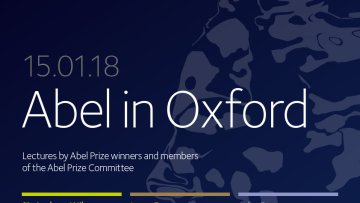Zero dimensional Donaldson-Thomas invariants of Calabi-Yau 4-folds
Abstract
We study Hilbert schemes of points on a smooth projective Calabi-Yau 4-fold X and define DT4 invariants by integrating the Euler class of a tautological vector bundle against the virtual class. We conjecture a formula for their generating series, which we prove in certain cases when L corresponds to a smooth divisor on X. A parallel equivariant conjecture for toric Calabi-Yau 4-folds is proposed. This conjecture is proved for smooth toric divisors and verified for more general toric divisors in many examples. Combining the equivariant conjecture with a vertex calculation, we find explicit positive rational weights, which can be assigned to solid partitions. The weighted generating function of solid partitions is given by exp(M(q) − 1), where M(q) denotes the MacMahon function. This is joint work with Martijn Kool.
12:45
Compact G2 manifolds and the Duality between M-Theory and Heterotic String Theory
Abstract
M-theory on K3 surfaces and Heterotic Strings on T^3 give rise to dual theories in 7 dimensions. Applying this duality fibre-wise is expected to connect G2 manifolds with Calabi-Yau threefolds (together with vector bundles). We make these ideas explicit for a class of G2 manifolds realized as twisted connected sums and prove the equivalence of the spectra of the dual theories. This naturally gives us examples of singular TCS G2 manifolds realizing non-abelian gauge theories with non-chiral matter.
The Abel Prize is the most prestigious prize in Mathematics. Each year, in anticipation of the prize announcement, an afternnon of lectues showcases previous winners and member of the Committee. This year the event will be held in Oxford on Monday 15th January. Andrew Wiles, John Rognes and Irene Fonseca will be the speakers. Full details below. Everyone welcome. No need to register.
Timetable:
Global Reflection Principles
Abstract
We reflect on the set-theoretic ineffability of the Cantorian Absolute of all sets. If this is done in the style of Levy and Montague in a first order manner, or Bernays using second or higher order methods this has only resulted in principles that can justify large cardinals that are `intra-constructible', that is they do not contradict the assumption that V, the universe of sets of mathematical discourse, is Gödel's universe of constructible sets, namely L. Peter Koellner has advanced reasons that this style of reflection will only have this rather limited strength. However set theorists would dearly like to have much stronger axioms of infinity. We propose a widened structural `Global Reflection Principle' that is based on a view of sets and Cantorian absolute infinities that delivers a proper class of Woodin cardinals (and more). A mereological view of classes is used to differentiate between sets and classes. Once allied to a wider view of structural reflection, stronger conclusions are thus possible.
Obtaining Woodin's Cardinals
P. D. Welch, in ``Logic in Harvard: Conference celebrating the birthday of Hugh Woodin''
Eds. A. Caicedo, J. Cummings, P.Koellner & P. Larson, AMS Series, Contemporary Mathematics, vol. 690, 161-176,May 2017.
Global Reflection principles,
P. D. Welch, currently in the Isaac Newton Institute pre-print series, No. NI12051-SAS,
to appear as part of the Harvard ``Exploring the Frontiers of Incompleteness'' Series volume, 201?, Ed. P. Koellner, pp28.
Linear orders in NIP theories
Abstract
A longstanding open question asks whether every unstable NIP theory interprets an infinite linear order. I will present a construction that almost provides a positive answer. I will also discuss some conjectural applications to the classification of omega-categorical NIP structure, generalizing what is known for omega-stable, and classification of models mimicking the superstable case.
Isotrivial Mordell-Lang and finite automata
Abstract
About fifteen years ago, Thomas Scanlon and I gave a description of sets that arise as the intersection of a subvariety with a finitely generated subgroup inside a semiabelian variety over a finite field. Inspired by later work of Derksen on the positive characteristic Skolem-Mahler-Lech theorem, which turns out to be a special case, Jason Bell and I have recently recast those results in terms of finite automata. I will report on this work, as well as on the work-in-progress it has engendered, also with Bell, on an effective version of the isotrivial Mordell-Lang theorem.
Counting lattice points and O-minimal structures
Abstract
Let L be a lattice in R^n and let Z in R^(m+n) a parameterized family of subsets Z_T of R^n. Starting from an old result of Davenport and using O-minimal structures, together with Martin Widmer, we proved for fairly general families Z an estimate for the number of points of L in Z_T, which is essentially best possible.
After introducing the problem and stating the result, we will present applications to counting algebraic integers of bounded height and to Manin’s Conjecture.


